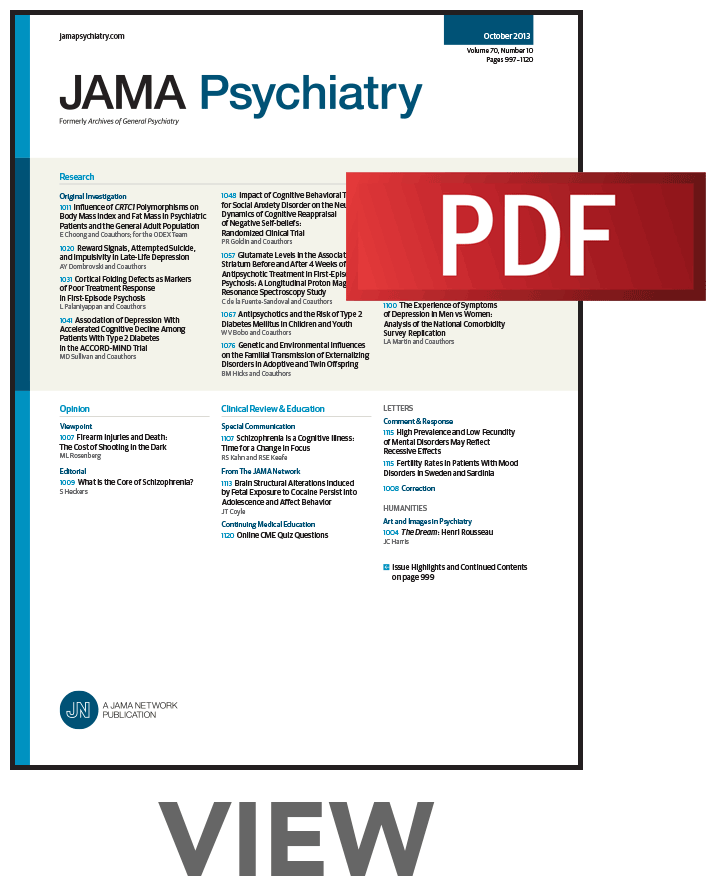Sweetened Beverages and Incident All-Cause Dementia Among Older Adults
IF 17.1
1区 医学
Q1 PSYCHIATRY
引用次数: 0
Abstract
ImportanceIntake of sweetened beverages, including sugar-sweetened beverages (SSB) and artificially sweetened beverages (ASB), has been linked to multiple health outcomes, but their associations with dementia risk among older adults are unclear.ObjectiveTo assess whether the consumption of SSB and ASB is associated with the risk of all-cause dementia in older adults.Design, Setting, and ParticipantsThis multicohort study examined data from US adults aged 65 and older enrolled in the Health and Retirement Study (2013), the Atherosclerosis Risk in Communities study (1987-1995), the Chicago Healthy and Aging Project (1993-2012), the Rush Memory and Aging Project (1997-2005), the Framingham Heart Study original cohort (1986-1994), and its offspring cohort (1991-2001). Data were analyzed from May 27 to September 24, 2024.ExposuresSSB and ASB intake was assessed using validated food frequency questionnaires.Main Outcomes and MeasuresThe primary outcome was all-cause dementia ascertained at least 2 years after baseline from active research follow-ups and passive surveillance. Cox proportional hazard regression models were used to assess the associations of SSB and ASB with incident dementia.ResultsOf 10 974 participants (60.0% female, mean [SD] age: 73.2 [6.8] years), 2445 developed incident all-cause dementia over 116 067 person-years of follow-up. Consumption of SSB and ASB in older adulthood was not associated with dementia risk in later life. The pooled hazard ratio (HR) per serving per week for SSB was 0.99 (95% CI, 0.98-1.01;含糖饮料与老年人全因痴呆的关系
摄入含糖饮料,包括含糖饮料(SSB)和人工加糖饮料(ASB),与多种健康结果有关,但它们与老年人痴呆风险的关系尚不清楚。目的评估老年人食用SSB和ASB是否与全因痴呆风险相关。设计、环境和参与者本多队列研究检查了美国65岁及以上成年人的数据,这些成年人参加了健康与退休研究(2013年)、社区动脉粥样硬化风险研究(1987-1995年)、芝加哥健康与老龄化项目(1993-2012年)、拉什记忆与衰老项目(1997-2005年)、弗雷明汉心脏研究原始队列(1986-1994年)及其后代队列(1991-2001年)。数据分析时间为2024年5月27日至9月24日。使用有效的食物频率问卷评估ssb和ASB摄入量。主要结果和测量主要结果是在基线后至少2年通过主动研究随访和被动监测确定的全因痴呆。采用Cox比例风险回归模型评估SSB和ASB与痴呆发生率的关系。结果在10974名参与者中(60.0%为女性,平均[SD]年龄:73.2[6.8]岁),在116 067人年的随访中,2445人发生了全因痴呆。老年人摄入SSB和ASB与晚年痴呆风险无关。每周每份SSB的合并风险比(HR)为0.99 (95% CI, 0.98-1.01;P = 0.18;I2 = 0%), ASB为1.00 (95% CI, 0.99-1.01;P = .99;I2 = 1%)。比较最高(每天≥1份)和最低(每月0至1份)消费组的总hr为,SSB组为0.90 (95% CI, 0.78-1.03), ASB组为1.00 (95% CI, 0.83-1.21)。这些发现在队列和亚组中是相似的。相比之下,地中海饮食评分呈负相关(HR, 0.92;95% CI, 0.85-0.99 / 5单位增量)作为阳性对照。结论和相关性在这项研究中,晚年食用SSB或ASB与痴呆的风险无关。然而,鉴于它们对早期和中年的代谢健康和相关慢性疾病的有害影响,早期食用SSB和ASB对痴呆风险的影响值得进一步研究。
本文章由计算机程序翻译,如有差异,请以英文原文为准。
求助全文
约1分钟内获得全文
求助全文
来源期刊

JAMA Psychiatry
PSYCHIATRY-
CiteScore
30.60
自引率
1.90%
发文量
233
期刊介绍:
JAMA Psychiatry is a global, peer-reviewed journal catering to clinicians, scholars, and research scientists in psychiatry, mental health, behavioral science, and related fields. The Archives of Neurology & Psychiatry originated in 1919, splitting into two journals in 1959: Archives of Neurology and Archives of General Psychiatry. In 2013, these evolved into JAMA Neurology and JAMA Psychiatry, respectively. JAMA Psychiatry is affiliated with the JAMA Network, a group of peer-reviewed medical and specialty publications.
 求助内容:
求助内容: 应助结果提醒方式:
应助结果提醒方式:


